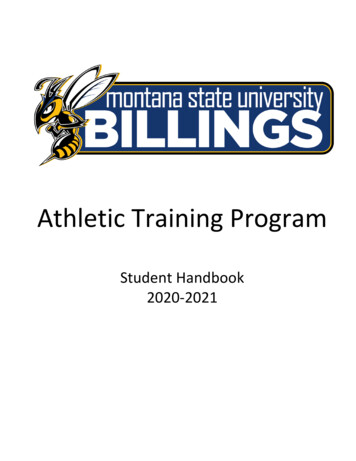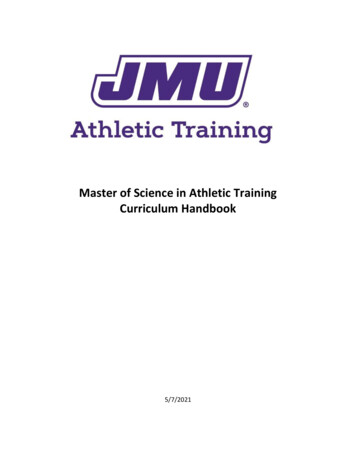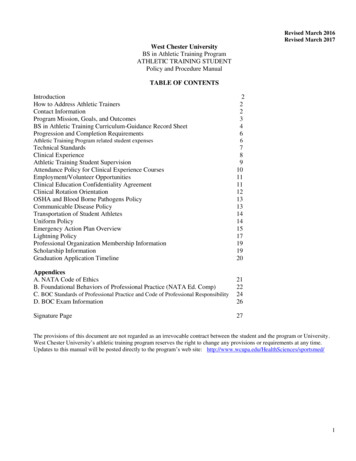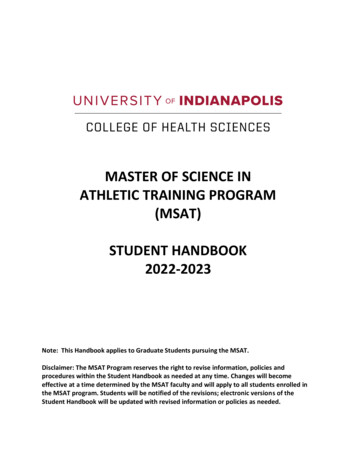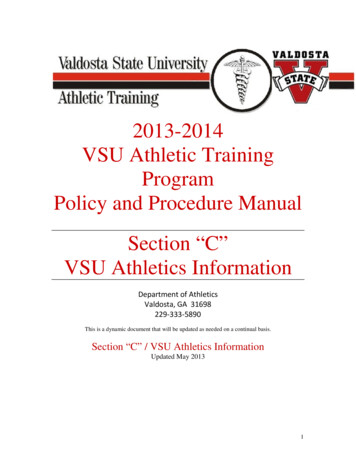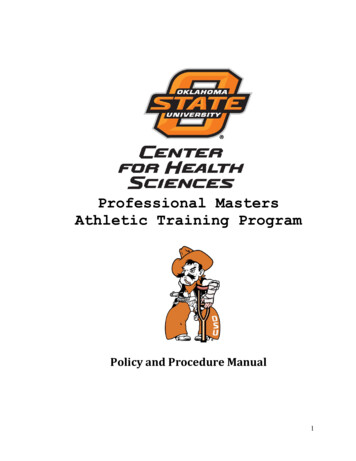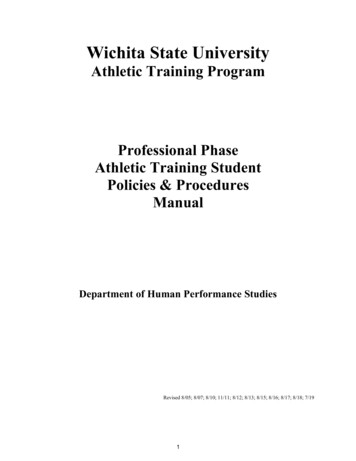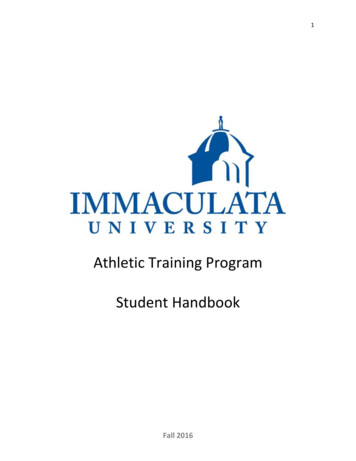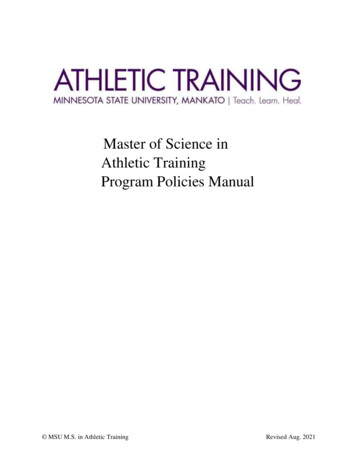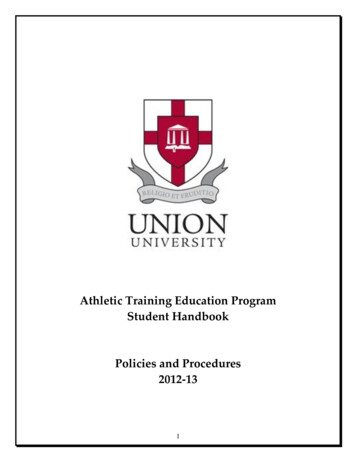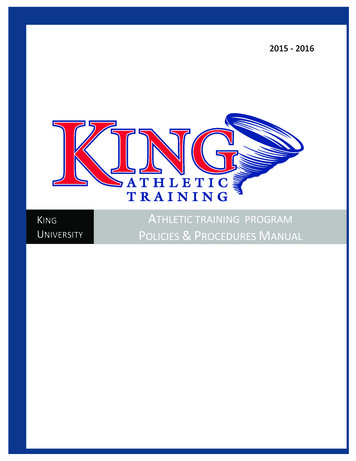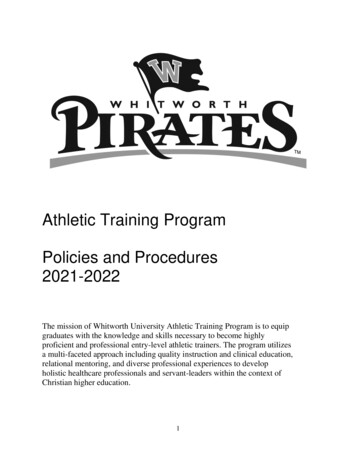
Transcription
Athletic Training ProgramPolicies and Procedures2021-2022The mission of Whitworth University Athletic Training Program is to equipgraduates with the knowledge and skills necessary to become highlyproficient and professional entry-level athletic trainers. The program utilizesa multi-faceted approach including quality instruction and clinical education,relational mentoring, and diverse professional experiences to developholistic healthcare professionals and servant-leaders within the context ofChristian higher education.1
Athletic Training Faculty and StaffCynthia Wright, ATCSmokey Fermin, ATCProgram DirectorAssociate ProfessorWestminster 123(509) 777-3244cwright@whitworth.eduAssistant ProfessorWestminster 121(509) 777-4389sfermin@whitworth.eduShane Wibel, ATCStacey Nauman, ATCClinical Education CoordinatorAssociate ProfessorWestminster 119(509) 777-3478swibel@whitworth.eduAdjunct FacultyAssociate ProfessorWestminster 127(509) 777-3464snauman@whitworth.eduNate Lamberty, ATCSarah Cummings, ATCAssistant Athletic TrainerFieldhouse 131(509) 777-4456nlamberty@whitworth.eduAssistant Athletic TrainerFieldhouse 134(509) 777-3216scummings@whitworth.eduBrittany Castilla, ATCJon Bosh, ATCAssistant Athletic TrainerFieldhouse 138(509) 777-4598bcastilla@whitworth.eduHead Athletic TrainerAssociate Athletic TrainerFieldhouse 133(509) 777-3728jbosh@whitworth.eduMatt Buckner, ATCAssistant Athletic TrainerContact TBDAthletic Training Team PhysiciansEd Reisman, MDMedical Director, Team PhysicianTycho Kersten, MDTeam Physician/Orthopedic Surgeon2
Athletic Training ProgramTABLE OF CONTENTSWhitworth Athletic Training Program Mission & Goals . 4National Athletic Trainers Association Code of Ethics . 5Academic Retention Requirements. 8Behavioral Expectations . 10Technical Standards . 12Additional Costs. 14MSAT Course Curriculum and Sequence. 15Clinical Experience Requirement . 17MSAT Clinical Experience Sequence . 19Off-Campus Clinical Experiences . 20Appearance Standards . 21Copy of WU Athletics Clinical Site Dress Code . 22Social Media Professionalism Policy. 23Supervision Policy (last revised 2014) . 24Outside Employment Policy (including hours limit) . 26Summer Camp & Paid Experience Policy Statement . 27Oath of Confidentiality . 29Communicable Disease Policy . 30Clinical Evaluation of Athletic Training Students . 32Sample Clinical Experience Evaluation Form . 33Bloodborne Pathogen Policies and Procedures. 35This manual is intended for AT students at Whitworth University. It contains policies,procedures and relevant professional information to direct and inform Whitworth AT students.All students accepted into the AT Program are responsible to learn and understand theinformation in this manual. Deviation from the policies and procedures may warrant placing thestudent on probation, suspension from clinical experiences, or dismissal from the AT Program. Ifan AT student does not understand any of the material provided they should consult with theprogram director.3
Whitworth Athletic Training Program Mission & GoalsAthletic Training Mission StatementThe mission of Whitworth University Athletic Training Program is to equip graduates with theknowledge and skills necessary to become highly proficient and professional entry-level athletictrainers. The program utilizes a multi-faceted approach including quality instruction and clinicaleducation, relational mentoring, and diverse professional experiences to develop holistichealthcare professionals and servant-leaders within the context of Christian higher educationStudent Learning Goals1. Goal: Whitworth University athletic training students will demonstrate entry-levelproficiency through classroom, laboratory and clinical learning experiences in the 5 domainsof athletic training: (1) Injury/Illness prevention and wellness protection, (2) Clinicalevaluation and diagnosis, (3) Immediate and emergency care, (4) Treatment andrehabilitation, and (5) Organizational and professional health and well-being2. Goal: Students will develop as a holistic healthcare professional in the context of Christianhigher education3. Goal: Students will demonstrate progression in professional behaviors consistent with theathletic training profession and healthcare.4. Goal: Students will appreciate the value of participation, service and/or leadership within theathletic training profession.Quality of Instruction5. Goal: Students will benefit from rigorous, hands-on, quality instruction from instructors withcontent expertise.Quality of Clinical Education6. Goal: Students will learn clinical skills under the supervision of high-quality preceptors athigh-quality clinical sites.7. Goal: Students will gain clinical experience as part of a healthcare team with a variety ofpatient/client populations and health conditions commonly seen in AT practice.Overall Program Effectiveness8. Objective: Students will successfully complete the program and be well prepared to meet thechallenges of entry-level employment positions.4
National Athletic Trainers Association Code of EthicsWhitworth’s AT Program also supports faculty, staff and students abiding by the NATA code ofethics.PREAMBLEThe National Athletic Trainers’ Association Code of Ethics states the principles of ethicalbehavior that should be followed in the practice of athletic training. It is intended to establish andmaintain high standards and professionalism for the athletic training profession.The principles do not cover every situation encountered by the practicing athletic trainer, but arerepresentative of the spirit with which athletic trainers should make decisions. The principles arewritten generally; the circumstances of a situation will determine the interpretation andapplication of a given principle and of the Code as a whole. When a conflict exists between theCode and the law, the law prevails.PRINCIPLE 1:Members Shall Practice with Compassion, Respecting the Rights, Welfare, and Dignity ofOthers1.1 Members shall render quality patient care regardless of the patient’s race, religion, age, sex,ethnic or national origin, disability, health status, socioeconomic status, sexual orientation, orgender identity.1.2. Member’s duty to the patient is the first concern, and therefore members are obligated toplace the welfare and long-term well-being of their patient above other groups and their ownself-interest, to provide competent care in all decisions, and advocate for the best medicalinterest and safety of their patient at all times as delineated by professional statements andbest practices.1.3. Members shall preserve the confidentiality of privileged information and shall not release orotherwise publish in any form, including social media, such information to a third party notinvolved in the patient’s care without a release unless required by law.PRINCIPLE 2:Members Shall Comply With the Laws and Regulations Governing the Practice of AthleticTraining, National Athletic Trainers’ Association (NATA) Membership Standards, and theNATA Code of Ethics2.1. Members shall comply with applicable local, state, federal laws, and any state athletictraining practice acts.2.2. Members shall understand and uphold all NATA Standards and the Code of Ethics.2.3. Members shall refrain from, and report illegal or unethical practices related to athletictraining.2.4. Members shall cooperate in ethics investigations by the NATA, state professionallicensing/regulatory boards, or other professional agencies governing the athletic trainingprofession. Failure to fully cooperate in an ethics investigation is an ethical violation.2.5. Members must not file, or encourage others to file, a frivolous ethics complaint with anyorganization or entity governing the athletic training profession such that the complaint isunfounded or willfully ignore facts that would disprove the allegation(s) in the complaint.5
2.6. Members shall refrain from substance and alcohol abuse. For any member involved in anethics proceeding with NATA and who, as part of that proceeding is seeking rehabilitationfor substance or alcohol dependency, documentation of the completion of rehabilitation mustbe provided to the NATA Committee on Professional Ethics as a requisite to complete aNATA membership reinstatement or suspension process.PRINCIPLE 3:Members shall maintain and promote high standards in their provision of services.3.1. Members shall not misrepresent, either directly or indirectly, their skills, training,professional credentials, identity, or services.3.2. Members shall provide only those services for which they are qualified through education orexperience and which are allowed by the applicable state athletic training practice acts andother applicable regulations for athletic trainers.3.3. Members shall provide services, make referrals, and seek compensation only for thoseservices that are necessary and are in the best interest of the patient as delineated byprofessional statements and best practices.3.4. Members shall recognize the need for continuing education and participate in educationalactivities that enhance their skills and knowledge and shall complete such educationalrequirements necessary to continue to qualify as athletic trainers under the applicable stateathletic training practice acts.3.5. Members shall educate those whom they supervise in the practice of athletic training aboutthe Code of Ethics and stress the importance of adherence.3.6. Members who are researchers or educators must maintain and promote ethical conduct inresearch and educational activities.PRINCIPLE 4:Members Shall Not Engage in Conduct That Could Be Construed as a Conflict of Interest,Reflects Negatively on the Athletic Training Profession, or Jeopardizes a Patient’s Health andWell-Being.4.1. Members should conduct themselves personally and professionally in a manner that does notcompromise their professional responsibilities or the practice of athletic training.4.2. All NATA members, whether current or past, shall not use the NATA logo in theendorsement of products or services, or exploit their affiliation with the NATA in a mannerthat reflects badly upon the profession.4.3. Members shall not place financial gain above the patient’s welfare and shall not participatein any arrangement that exploits the patient.4.4. Members shall not, through direct or indirect means, use information obtained in the courseof the practice of athletic training to try and influence the score or outcome of an athleticevent, or attempt to induce financial gain through gambling.4.5. Members shall not provide or publish false or misleading information, photography, or anyother communications in any media format, including on any social media platform, relatedto athletic training that negatively reflects the profession, other members of the NATA,NATA officers, and the NATA office.6
Policies Related to Admission, Probation & Program StatusAdmission Policies and CriteriaMSAT admission requirements and online application are available online. All applicantssubmitting a completed application will be reviewed assigned an admission status of fulladmission, condition admission, or not admitted.Full AdmissionApplicant meets all admission requirements and has demonstrated high potential for success inthe MSAT program as evaluated by the admission committee.Conditional AdmissionApplicant has demonstrated potential for success in the MSAT program, but has at least oneunmet admission requirement. For example, the applicant is currently enrolled in PY 101 andfinal grades will not be posted until May (thus they have not met the requirement for a “C” orbetter in PY 101 yet). The admission letter will clearly list each outstanding requirement. Thestudent will be automatically changed to “full admission” status once verification of alloutstanding requirements being met is received.Not AdmittedCandidate has not provided sufficient evidence for success in the MSAT program. Not Admittedstatus may be assigned for failure to meet posted admission criteria (e.g. insufficient GPA,course not completed), or for an overall admission rubric score that is not competitive. Allapplicants are graded on an admissions rubric, and only the topic 14 candidates each year will beadmitted.Change in Status and ProbationStudents may be placed on probation, suspended or expelled from the MSAT program forviolations of policies and expectations laid out in this manual, or violations of WhitworthUniversity student conduct standards. Students will be notified through college email regardingany change in their program status. It is the candidates’ responsibility to monitor their statuswithin the program. Candidates who drop in status are placed on probation within the program.Candidates on probation have until the end of the next long semester to remedy the concern(s)which dropped their status within the program. The causes of probation will be given to thecandidate in writing. If the concern(s) is not addressed, a candidate may be suspended orexpelled from the MSAT Program (and thus University). A candidate may also be suspended orexpelled from the MSAT Program without probation, if the concern was considered extreme or itbecomes apparent that the issue is not remediable. The AT Program Director, in consultationwith program faculty members, is responsible for the monitoring of student status within theprogram.7
Academic Retention RequirementsNo credit toward a master’s degree will be allowed for a course in which the student receives agrade of “C” or lower. A student will be required to re-take (at additional expense) any requiredcourse where they earn a “C” or lower. Note: This is a higher standard than the WhitworthGraduate Studies policy of “C-” or higher. Additionally, in accordance with Graduate Studiespolicy, “following any term/module in which a student’s cumulative grade point average isbelow 3.0, the student may be placed on academic probation. The student may be dismissed fromthe graduate program if three grades of “C” or lower are accumulated, or if it is necessary for thestudent to be placed on academic probation more than twice."Additionally, each instructor has the right to require students to earn a 70% or above on eachmajor exam or project. Students not meeting this standard will be expected to repeat the exam orproject, demonstrating improved proficiency by raising their score 70%. Students earning apassing grade in the class overall, but with a major exam or project 70% may face remediation,including being placed on program probation.If a student repeats a course or withdraws from a course, it may impact their financial aid.Notify the financial aid office immediately to avoid unpleasant surprises!Appeal ProcessPer the Whitworth University Catalog:1. The right of appeal, through instructors/professors/deans in the following order, isavailable for students who feel they have received an unfair grade:1. the instructor of the course2. the program director3. the dean or dean's designee of the school2. Appeals in cases of [academic] suspension or expulsion:Discuss the issue first with the program director; the right of appeal is available to allstudents if the appeal is presented in writing within three weeks of the incident, to thefollowing people in the following order:1. the program director2. a committee composed of the dean of the school, the director/chair of theprogram, and representatives of the program3. the Educational Review BoardPer AT Program Policy:1. The right of appeal is available for students who feel they have been placed on programprobation or program suspension unfairly:a. Appeals must be made in writing, dated and addressed to the AT ProgramDirector, and should provide evidence supporting the appeal. Appeals must bemade within 30 days of the notification of change in status.b. First Level Appeal: The AT Program Director brings the appeal to the ATprogram faculty for a decision. The Health Sciences Department Chair will benotified at this time and may elect to participate in the decision process at thislevel of appeal.8
c. Second Level Appeal: The appeal is brought to the Associate Provost in theAcademic Affairs Office. The Associate Provost brings the appeal before anappropriate committee (which may include the AT Program Director, HealthScience Chairperson, Dean, the academic review board, or others).d. Decisions regarding appeals will be provided to the student in writing and will besent in a timely manner.e. Appeals may not be made directly to an off-campus clinical site or preceptor asthese entities are independent of the University in student program statusdecisions.9
Behavioral ExpectationsCode of ConductThe expected behavior of all members of the Whitworth University Athletic Training Program isstated in the NATA Code of Ethics (see previous section) and the Whitworth University StudentHandbook. The program emphasizes professional behavior in all athletic training relatedpractices as well as in each member's private lives, when applicable (see NATA principle 5.1).All of our actions reflect not only on the program but also on our individual commitment tobeing healthcare providers with high standards of professionalism. The program holds up JesusChrist as the ultimate example of Christian living and encourages and supports all of its membersand students in the pursuit of this example.As presented in Whitworth University Student Handbook:“It is our conviction that as members of a Christian community we should guide our behavior notsolely by adherence to civil and criminal law but by principles of personal conduct and life incommunity that are presented to us in Scripture. In addition, we draw on insights provided bycontemporary developmental psychology and are guided by commitments to personal health andresponsible life in community. Because of these convictions, Whitworth's behavioralexpectations are reflections of values that are foundational to the character of the Whitworthcommunity – values that are interrelated with Whitworth's mission to glorify God throughcommitment to educational excellence, liberal learning, Christian faith and growth.”Any breach of these expectations may result in further penalties such as probation or dismissalfrom the Athletic Training Program. Each case will be dealt with individually by the ProgramDirector and other appropriate personnel.Remember: you write your own letter of recommendation every day, make it a good one!Program CommunicationWe require that each student utilize their Whitworth University email account and check itregularly. Prompt reply to requests from the AT Program Director and faculty is expected and isevidence of professional and courteous communication habits. Students are also requested toprovide their cell phone numbers to clinical faculty and communicate through voice and textmessaging if that is feasible and agreed upon by both parties (ATS and preceptor). Both shoulddiscuss the use of text messaging and appropriate communication practice and boundaries.Policy on romantic relationships with patients who are consenting adultsIt is unethical and violates many state licensure acts for a healthcare provider to engage in aromantic relationship with a current or former patient. This is due in part to the power thehealthcare provider has over the patient. The unequal footing can lead to coercion. The patientmay feel pressure to consent. They may perceive that refusing romantic advances could havenegative implications for their healthcare.In accordance with the Washington State Legislature (WAC 246-16-100), “A health careprovider shall not engage, or attempt to engage, in sexual misconduct with a current patient,10
client, or key party, inside or outside the health care setting. Sexual misconduct shall constitutegrounds for disciplinary action. Sexual misconduct includes but is not limited to: [kissing,hugging, sexual intercourse, suggestive speech, etc.].” Note: any romantic contact with a patientis considered sexual misconduct because it should not happen—sexual misconduct is not limitedto coercion or inappropriate touch. Additionally, even after the end of the patient-providerrelationship, “A health care provider shall not engage, or attempt to engage, in the activitieslisted [above] with a former patient, client or key party within two years after the providerpatient/client relationship ends.” (WAC 246-16-104)As future health care professionals, Whitworth MSAT students will be held to similar standards.ATS are not permitted to engage in a new romantic relationship with any patient at anassigned clinical site (including Whitworth) during their time in the MSAT program.Violation of this policy will be cause for program probation, suspension or removal dependingon the severity of the violation.Upon entry to the MSAT program, ATS will be asked to declare any current, preexistingromantic relationships with Whitworth student-athletes or any other individual who may be apatient at an assigned clinical site. If declared upon entry, the existing romantic relationship willnot be cause for disciplinary action as a violation of this policy. If declared, ATS will not beallowed to interact with the student-athlete as a healthcare provider (e.g. the ATS cannot treatthat individual, the ATS may not be assigned to that sport), thus minimizing the potential for aconflict of interest. If this romantic relationship declared is with a student-athlete at anotherclinical site (e.g. Gonzaga University) the ATS will not be assigned to that clinical site.“But what if I meet my soul mate?” Even if you feel a strong connection to patient, according toWashington State Legislature not only can you not act on it now, healthcare providers must waittwo years after the end of the patient-provider relationship. Why? Because relational powerdoes not end the day after the season ends. Think of your high school teachers, do you still callthem Mr. Smith and Ms. Jones rather than Ben and Sally? Still think of them first and foremostas your teacher, someone with authority? They still have presumed relational power even yearsafter your teacher-student relationship officially ended. It is similar in patient-providerrelationships. If you truly care about someone, you care about their free will and consent!This policy is also in accordance with Whitworth athletics policy, which prohibits graduateassistants working with various sports to engage in romantic relationships with Whitworthstudent-athletes. The potential for a power/authority imbalance between graduate andundergraduate students also makes a romantic relationship unethical.Note: This policy does not address romantic relationships with minors, because they are clearlyillegal! ATS accused of engaging with a romantic relationship with a minor will be reported tolocal law enforcement and face disciplinary action within the MSAT program.11
Technical StandardsAdapted from the NATA Education Council GuidelinesThe Athletic Training Educational Program at Whitworth University is a rigorous and intenseprogram that places specific requirements and demands on the students enrolled in the program.An objective of this program is to prepare graduates to enter a variety of employment settingsand to render care to a wide spectrum of individuals engaged in physical activity. The technicalstandards set forth by the Athletic Training Educational Program establish the essential qualitiesconsidered necessary for students admitted to this program to achieve the knowledge, skills, andcompetencies of an entry-level athletic trainer, as well as meet the expectations of the program'saccrediting agency (Commission on the Accreditation of Athletic Training Education [CAATE]).Compliance with the program’s technical standards does not guarantee a student’s eligibility forthe Board of Certification (BOC) certification exam.The following abilities and expectations must be met by all students admitted to the AthleticTraining Educational Program. In the event a student is unable to fulfill these technicalstandards, with or without reasonable accommodation, the student will not be admitted into theprogram.Candidates for selection to the Athletic Training Educational Program must demonstrate:1.The mental capacity to assimilate, analyze, synthesize, integrate concepts and problemsolve to formulate assessment and therapeutic judgments and to be able to distinguishdeviations from the norm.2.Sufficient postural and neuromuscular control, sensory function, and coordination toperform appropriate physical examinations using accepted techniques; and accurately, safely andefficiently use equipment and materials during the assessment and treatment of patients.Physical skills required in the athletic training profession commonly include: Standing for 1-3 hours at a time during clinical experiences Ambulating 5-100 yards indoors or outdoors over rough terrain at a speed thatpermits safe provision of patient care Lifting objects up to 50lbs Providing physical support and/or lifting an injured patient Twisting, bending and/or kneeling on the floor while providing patient care Providing patient assessment and care such as: visual inspection, palpation,stability testing, application of pressure to stop bleeding, and the ability toperform cardio pulmonary resuscitation.3.The ability to communicate effectively and sensitively with patients and colleagues,including individuals from different cultural and social backgrounds; this includes, but isnot limited to, the ability to establish rapport with patients and communicate clinicaldecisions and treatment information effectively. Students must be able to understand andspeak the English language at a level consistent with competent professional practice.4.The ability to record the physical examination results and a treatment plan clearly andaccurately.5.The capacity to maintain composure and continue to function well during periods of highstress.12
6.7.8.The perseverance, diligence and commitment to complete the athletic training educationprogram as outlined and sequenced.Flexibility and the ability to adjust to changing situations and uncertainty in clinicalsituations.Affective skills and appropriate demeanor and rapport that relate to professionaleducation and quality patient care.Candidates for selection to the athletic training educational program will be required to verifythey understand and meet these technical standards or that they believe that, with reasonableaccommodations, they can meet the standards.The Education Support Services Office in collaboration with the Athletic Training EducationProgram will evaluate a student who states he/she could meet the program’s technical standardswith accommodation and confirm that the stated condition qualifies as a disability underapplicable laws.If a student states he/she can meet the technical standards with accommodation, then theUniversity will determine whether it agrees that the student can meet the technical standards withreasonable accommodation; this includes a review a whether the accommodations requested arereasonable, taking into account whether accommodation would jeopardize clinician/patientsafety, or the educational process of the student or the institution, including all coursework,clinical experiences and internships deemed essential to graduation. A student may beadministratively withdrawn if it becomes apparent that the student cannot complete essentialtasks even with accommodation, that the accommodations needed are not reasonable and wouldcause undue hardship to the institution, or that fulfilling the functions would create a significantrisk of harm to the health or safety of others.Sign ONLY ONE statement below:Statement 1: For students not requesting accommodationsI certify that I have read and understand the technical standards for selection listed above, and Ibelieve to the best of my knowledge that I meet each of these standards without accommodation.I understand that if I am unable to meet these standards I will not be admitted into the pro
Members Shall Comply With the Laws and Regulations Governing the Practice of Athletic Training, National Athletic Trainers' Association (NATA) Membership Standards, and the NATA Code of Ethics 2.1. Members shall comply with applicable local, state, federal laws, and any state athletic training practice acts. 2.2.
